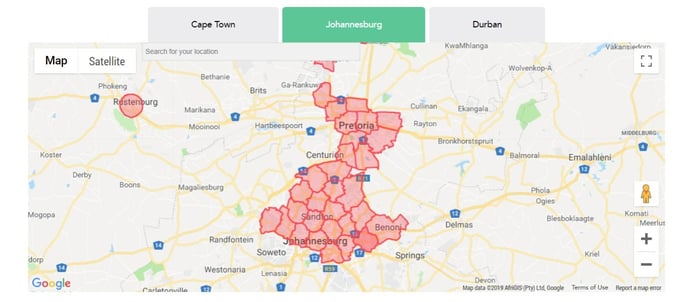
TL; DR: As recently as 10 years ago, most of South Africa had limited access to the internet, but today, the nation is fast becoming an ecommerce powerhouse. RSAWEB, which was founded in 2001, is a hosting provider that has grown alongside South Africa’s internet infrastructure. The RSAWEB team understands how to serve and support local businesses, and its culture isn’t just about building robust and reliable services, but also establishing relationships with its customers.
RSAWEB occupies a unique space among hosting providers: Since 2001, its business has thrived in South Africa — one of the world’s largest developing internet markets. The story of RSAWEB’s growth and South Africa’s ecommerce maturation are closely intertwined.
“Our co-founders registered RSAWEB when connectivity was very expensive in South Africa because few undersea cable systems were available,” said Sean Rose, Product Manager at RSAWEB. “The range of choices — particularly for business and enterprise-grade services — was quite limited. For many years, ADSL and Diginet lines were the primary internet access mediums. By the early 2000s, fiber had become an option, but only for large businesses.”
Before 2008, connectivity wasn’t a revenue driver for RSAWEB, but, over the last decade, the South African market has dramatically changed. Undersea cable systems now connect the country with the world and network providers have laid a national fiber-optic cable footprint. As the connectivity market became commoditized, RSAWEB adapted its technologies to add products that cater to the trend.

RSAWEB develops connectivity solutions that cater to South Africa’s burgeoning internet market.
According to Sean, the South African marketplace is still evolving, and there is plenty of buzz about RSAWEB’s partnership with Microsoft Azure and AWS services. But companies in South Africa operate under a specific set of economic constraints — including the country’s currency valuation. International hosting providers have yet to adapt their pricing models to the market.
While hosting plans with an international provider might look attractive on paper, they often present long-term problems for South African businesses. RSAWEB provides customized solutions that address local needs at a reasonable price point.
“Our economy is fluid — in terms of both currency and politics — which means our businesses need resilient and agile solutions. They need a partner who shares their perspective and understands their situation,” Sean said. “We’re more than just a product — we’re an advocate.”
Leveraging Innovation to Help South African Businesses Succeed Online
As the South African marketplace changed, RSAWEB built a stronger product and added new solutions. The company has always delivered traditional web services, but it has also developed its own public cloud offering to align itself with customer needs.
That’s also why RSAWEB partnered with AWS and Microsoft Azure. Today, its consumer division provides home services, mobile data, LTE solutions, and, of course, web hosting. And, to widen the reach of those solutions, RSAWEB has developed an array of API integrations.
“All of these help us achieve our primary goal — to leverage the modern, scalable, sustainable, and adaptable technologies that will help our customers succeed,” Sean said.

While RSAWEB developed its own cloud, the company doesn’t try to sell it to customers who don’t need it.
In addition to forming productive partnerships and adding new technologies, RSAWEB has also made significant decisions about its internal infrastructure. Sean said that, traditionally, RSAWEB has developed its own shared hosting platform. But, as cybercrime has increased, the company has migrated to cPanel. And Sean said he considers cPanel the perfect fit for RSAWEB’s growth plan.
“From an organizational perspective, it costs a lot of money and takes time to build new infrastructure. When we looked at the support services and resources that go into developing a platform, we decided that it made more sense to use cPanel,” Sean said.
And the RSAWEB team has been happy with the results. The switch has instilled confidence that the company is delivering resilient and robust services to its customers — whether they run a single-page family website or an enterprise-grade ecommerce environment.
Partnering with Customers to Create Custom Solutions
While RSAWEB’s diverse product suite includes innovative solutions for home and business technologies, its primary business value lies in building relationships.
“During my time as a salesperson in the technical space, I learned that most hosting companies sell the same products and services,” Sean said. “The differentiator between one provider and another isn’t products or features. It’s the ability to extend their customers’ business reach.”
That is the impetus behind innovation at RSAWEB. It allows the company to support customers as effectively as possible.
“I’ve spent a lot of time traveling to various conferences and listening to providers talk about product features and service-level agreements,” said Sean. “But what those providers aren’t doing is listening to their customers, who are asking a simple question they don’t answer: ‘Will your technology help my business succeed?’”
That’s why RSAWEB builds solutions that adapt to the unique business needs of its customers. According to Sean, many of the company’s customers rely on legacy infrastructure and hardware, meaning they aren’t necessarily ready to move to a cloud-based solution. Many providers tell prospective customers that migrating to the cloud will be cheaper than running existing physical infrastructure. But RSAWEB consults with customers one-on-one to explain the total cost of ownership to find out if a cloud solution would be more cost-effective.

A significant part of RSAWEB’s success is the network footprint it has built in South Africa.
“For some of our customers with smaller businesses, the smart move is to refresh hardware and maintain the small infrastructure they already have,” said Sean.
RSAWEB doesn’t push products just because they’re on the cutting edge and it won’t force customers into one-size-fits-all solutions that won’t help them reach their goals.
“We’re partners,” said Sean. “We navigate the technology and assume the role of advisors and consultants to help our customers make good decisions and leverage technology efficiently. Our expertise and industry knowledge enable us to build solutions that add value to our customers’ businesses.”
And companies can be sure that RSAWEB has their best interests at heart because the company will even suggest a better fit if its products and services fall short of their needs.
“Sometimes, we’re unable to provide the solution a customer needs. When that happens, we suggest another service provider that will be a better fit,” Sean said. “Our goal isn’t to lock people into contracts and profit from every interaction. It’s to focus on service delivery, solutions architecture, and customer success.”
Built to Meet the Unique Needs of the Emerging South African Market
Some of our customers who have migrated to RSAWEB from overseas hosting providers have done so as the complexities of doing business online in South Africa are quite different to other markets.
For example, the award-winning South African CRM GreatSoft initially relied on out-of-country hosting. “Because it wasn’t local, the latency between the end user and the datacenter severely affected our application’s performance. Since moving to RSAWEB, we’re able to support clients instantly and analyze information without having to wait for remote access to be granted or data to be shipped to our offices,” said Roelof Botha, GreatSoft’s Hosting Services Manager, in one RSAWEB case study.
Another problem unique to South Africa is called “load shedding.” Because Eskom, the country’s public electric utility, has faced coal shortages and financial problems, power is often cut off to avoid burning out the plants that generate electricity. “With load shedding becoming a part of everyday life, we have had to get creative about how we keep our operating running, especially when electricity is down for hours on end,” said Derek Kennedy, the Operations Manager of Caxton, one of the country’s largest publishers and printers, in another case study.
RSAWEB came to Caxton’s rescue with its Business Mobile Data plan. When Eskom cuts the office’s power, Caxton employees switch from desktops to working on laptops and mobile devices. Because those devices can handle 15 hours of continuous use, the team can keep working through even the most extended power outages. A hosting provider headquartered in the U.S. or the U.K. may never have to make a contingency plan for that kind of issue — but RSAWEB has a plan and delivers solutions.
Nurturing these relationships with its South African clients has paid off for RSAWEB. The company has become one of the most trusted in the country, especially for businesses considering scaling up.
“Customers have called us in the middle of a business acquisition to ask, ‘Does this make sense in terms of where we’re going?’” Sean said. “Our customers know that we understand their businesses and want them to succeed.”
HostingAdvice.com is a free online resource that offers valuable content and comparison services to users. To keep this resource 100% free, we receive compensation from many of the offers listed on the site. Along with key review factors, this compensation may impact how and where products appear across the site (including, for example, the order in which they appear). HostingAdvice.com does not include the entire universe of available offers. Editorial opinions expressed on the site are strictly our own and are not provided, endorsed, or approved by advertisers.
Our site is committed to publishing independent, accurate content guided by strict editorial guidelines. Before articles and reviews are published on our site, they undergo a thorough review process performed by a team of independent editors and subject-matter experts to ensure the content’s accuracy, timeliness, and impartiality. Our editorial team is separate and independent of our site’s advertisers, and the opinions they express on our site are their own. To read more about our team members and their editorial backgrounds, please visit our site’s About page.

